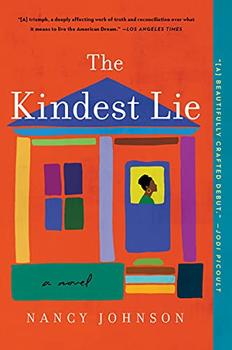Summary | Excerpt | Reviews | Read-Alikes | Genres & Themes | Author Bio

Lick up all the drips. In Heaven, Indiana chances for happiness melt as fast as a cherry-lime snow cone on a carnival midway. Against a backdrop of Ferris wheels and fortunetellers, 40 years of life in small-town Heaven unfold in this first novel by Seattleite Jan Maher
One hot week in August 1954, in Heaven, Indiana, a baby is delivered twice: once in a barn by her grandfather, the second time to the tent door of a carnival fortune-teller by her grandmother Helen. The baby, Nadja, becomes part of a long tradition of well-kept secrets in the tiny town of her birth. She grows up traveling with her adoptive grandmother, the fortune-teller, learning to develop her own gifts of precognition, reading the remains of lunches and dinners to see what lies ahead in her clients' lives.
Meanwhile, two other girls born in Heaven that same year are growing to maturity. Ellie Denson waits tables at Clara's Kitchen, and searches maps in her spare time, haunted by powerful urges to be Somewhere Else. Sue Ellen Sue Tipton marries her high school sweetheart and happily takes on the role of the town hairdresser, keeping herself informed on the latest in permanent waves and gossip, some of which revolves around Helen's temporary insanity and Lester's numerous affairs.
In spite of the penchant Heaven's denizens have for quietly getting into each other's business, a great many secrets manage to remain hidden, stuffed into apron pockets, tucked into attic trunks, locked into desk drawers. When Nadja's Granny decides to retire in Heaven, their reappearance in town begins to tease a number of these stories out into the open, with results that really give the town something to talk about. The stories emerge against the backdrop of Indiana's larger history of secrets, ranging from pre-Civil War anti-slavery societies to post-Reconstruction Klan activities.
Heaven, Indiana weaves the subtle humor and muted manners of the Hoosier State together with its sometimes foolish and sometimes devastating legacy of secrets to trace how Ellie Denson does, finally, manage to leave and Nadja does, finally, truly get to come home.
 Carol Bly, author of My Lord Bag of Rice and Beyond the Writers' Workshop
I love your humane, welcoming presence in the narrative...also a kind of ongoing background wit...I want to tell you you have real fictionness (a term I think the critic Donald Hall thought up himself)-story-ness, a blessed relief from obviously converted autobiography, and I will look forward all day to knowing I have a real book to disappear into tonight....You have got to have one of the most visual minds of any writer. Amazing.
Carol Bly, author of My Lord Bag of Rice and Beyond the Writers' Workshop
I love your humane, welcoming presence in the narrative...also a kind of ongoing background wit...I want to tell you you have real fictionness (a term I think the critic Donald Hall thought up himself)-story-ness, a blessed relief from obviously converted autobiography, and I will look forward all day to knowing I have a real book to disappear into tonight....You have got to have one of the most visual minds of any writer. Amazing.
If you liked Heaven, Indiana, try these:

by Nancy Johnson
Published 2022
Powerful and revealing, The Kindest Lie captures the heartbreaking divide between Black and white communities and offers both an unflinching view of motherhood in contemporary America and the never-ending quest to achieve the American Dream.

by Lorna Landvik
Published 2008
The View from Mount Joy, Lorna Landvik’s delightfully quirky and intensely moving new novel, is about a man, a supermarket, the roads not taken, and the great, unexpected pleasures found in living a good life.
Knowledge is of two kinds. We know a subject ourselves, or we know where we can find information on it.
Click Here to find out who said this, as well as discovering other famous literary quotes!